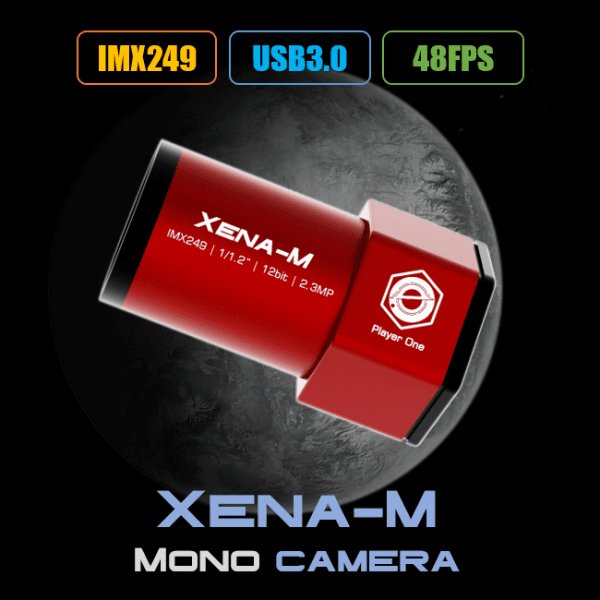
Player One Astronomy guiding camera series, AKA Dwarf Planet Series, is design for guiding and imaging. This series including 3 sub-series, Ceres, Sedna and Xena.

Product Description

Xena-M is a guiding camera developed by Player One Astronomy, which adopts the Sony IMX249 1/1.2” format sensor. The 5.86um pixel size accommodates a well depth of 32ke with a total of 2.3MP (the resolution is 1936*1216), and the diagonal is 13.3mm.
This IMX249 sensor has same performance as IMX174 sensor, transmit speed of IMX249 is 48fps.
Highlights
Dwarf planet series integrated USB3.0 data port(500Mb/s), which can provide over 10 times speed than USB2.0 device(60Mb/s). Whatever you wants to do guiding or imaging, this camera series can handle it very well.
Dwarf planet camera diameter is 1.25″, it can slide in 1.25″ adapter of guiding scope, makes the whole setup shorter.

With a 5-100MM CS lens attached on the camera, it also can be used as a guider or finder.

Features:

The naming of Player One guiding cameras is interesting. Guiding camera is smaller than planetary camera, that’s why we choose dwarf planets to name it.
The size of each dwarf planet to a certain extent represents the size of camera sensors. We will name Ceres with a 1/3″ sensor camera, and for Xena, we will name it with a 1/1.2 inch sensor camera. All names will be engraved on the housing of the cameras.
Cutting-edge Design
The guiding cameras developed by Player One Astronomy uses technological regular hexagon to construct the main body line.

Nova Boosting technology
Nova Boosting technology from Player One Astronomy is using hardware technology to overclock the fequency of sensor, then increase the FPS of sensor. Offcial speed of IMX249 sensor on Sony website is 30FPS, some camera with IMX249 camera only has 22FPS. But with Nova Boosting technolgy, our Xena-M (IMX249) camera can reach 48FPS. NB technology made Xena-M is fast enough for solar, luanr and planetary imaging. This technology is also used on our other cameras too.

DPS technology
The guiding cameras from Player One Astronomy have DPS (Dead Pixel Suppression) technology. The DPS is anaylse many dark frames to find out thoes fixed abnormal pixel and record the map in camera memory. In imaging, each exposure frames, thoes position of dead pixels will be given a median value according to the active pixels around that abnormal pixel.

Overvoltage and overcurrent protection mechanism
Player One cameras produced by the number one player ensures the safety of your camera and other equipment through overvoltage and overcurrent protection mechanisms.
Data Port
When the camera is connected to the USB3.0 interface and full-resolution preview is used, it can reach 48 FPS in RAW8 mode (10bit ADC). When recording images, since the actual writing speed will be affected by the writing speed of the hard disk itself, when the hard disk writing speed is slow, the recording may not reach the theoretical speed. It is recommended that you use a high-quality solid state drive to record data to give full play to the performance of the camera.
Use the ST4 guide cable to connect the camera and the AUTO GUIDE port of the equatorial mount to do guiding.

Performance

Readout Noise
Regarding readout noise, we solemnly promise that all values are obtained from actual tests. And for users, you could use Sharpcap 4 for testing. SC4 has a function called Sensor Analysis, provide a very simple way to test readout noise.
After many rigorous readout noise tests, the Xena-M camera can reach a low readout noise of 3.57e at a gain of 350.
If you are interested in readout noise testing, you may try it yourself, which is very simple.
QE Curve
Xena-M camera has about 77% QE peak.

Mechanical Drawing




